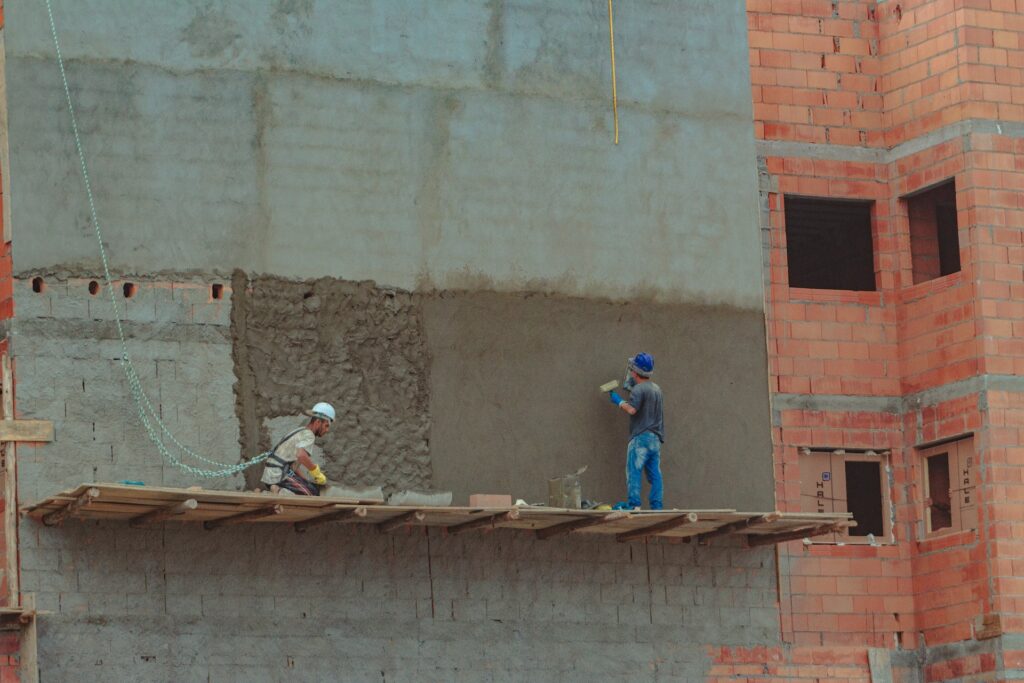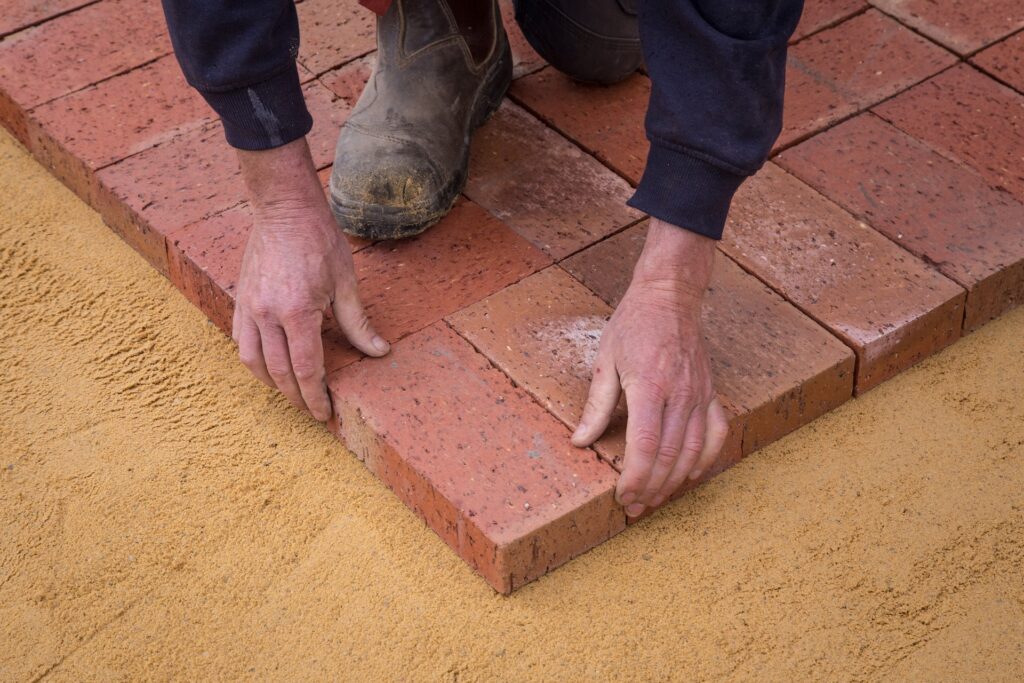Brick masons are the ones who build the bare structure of our house by lying down bricks on top of each other and if there’s a problem in hiring the right brick mason then the foundation of the house might be at risk.
In this guide, we delve into the core aspects of hiring a brick mason that extend beyond a mere job description. From assessing their craftsmanship to evaluating their safety practices, we’ll navigate the critical checkpoints that ensure you’re selecting the right artisans for your projects.
By exploring the multifaceted dimensions of a brick mason’s role, we equip recruiters with the insights needed to make informed decisions. After all, the success of construction projects hinges not only on the bricks and mortar but on the skillful hands that shape them.
Understanding the role of a brick mason
In the realm of construction, the role of a brick mason stands as a cornerstone of expertise and craftsmanship. Brick masons are skilled artisans responsible for creating durable and aesthetically pleasing structures using bricks, concrete blocks, and other types of masonry materials. Their work extends far beyond merely stacking bricks; it involves meticulous planning, precision, and an acute understanding of architectural design.
Brick masons are tasked with building walls, chimneys, facades, and various architectural features that define the character of a building. They meticulously place each brick or block, ensuring alignment, levelness, and structural integrity. Beyond the technical aspects, brick masons contribute to the visual appeal of structures, bringing architectural visions to life through their artistry.
From residential homes to grand commercial projects, brick masons play an essential role in shaping the physical landscape. Their work not only provides the foundational strength of a structure but also contributes significantly to its overall aesthetic. As technology continues to evolve, brick masons adapt their skills to work with new materials and techniques while preserving the time-honored traditions of their craft.
In the following sections, we’ll delve deeper into the skills, qualifications, safety practices, and assessment methods that recruiters should consider when hiring these masterful craftsmen. Understanding the multifaceted role of a brick mason is the first step towards finding the right fit for your construction team and ensuring the success of your projects.
Essential skills and qualifications
The role of a brick mason demands a specialized set of skills and qualifications that contribute to the success of construction projects. Beyond the physical demands of the job, a skilled brick mason possesses a blend of technical expertise, artistic sensibility, and a commitment to safety.
First and foremost, a solid foundation in masonry techniques is crucial. Proficiency in mixing mortar, laying bricks with precision, and constructing intricate patterns are fundamental skills. A skilled brick mason should also be well-versed in interpreting architectural blueprints and designs to translate them into tangible structures.
Physical stamina and dexterity are paramount in this role. Brick masons often work outdoors, carrying heavy loads of materials, and spending extended periods in physically demanding positions. The ability to work in various weather conditions while maintaining quality workmanship is a hallmark of a dedicated brick mason.
Safety consciousness is non-negotiable. A qualified brick mason is knowledgeable about safety protocols, such as proper scaffolding use, wearing personal protective equipment, and preventing hazardous situations.
Certifications and formal training in masonry techniques further validate a brick mason’s proficiency. While not always mandatory, these qualifications demonstrate a commitment to continuous improvement and staying updated with industry standards.
By assessing candidates for these essential skills and qualifications, recruiters can confidently identify brick masons who will contribute to the excellence and longevity of construction projects.
Craftsmanship and attention to detail
Craftsmanship and meticulous attention to detail are the cornerstones of a remarkable brick mason. In the world of construction, every brick laid contributes to the overall strength, durability, and aesthetic appeal of a structure. A skilled brick mason understands that precision is not merely a preference but an absolute necessity.
The artistry of bricklaying involves aligning each brick with impeccable accuracy, ensuring consistent mortar application, and maintaining uniformity in joints. Every angle, every surface, and every joint is meticulously assessed, demonstrating the brick mason’s commitment to delivering work of the highest quality.
Attention to detail goes beyond technical precision; it involves a deep understanding of how various materials interact, ensuring compatibility and longevity. A seasoned brick mason knows that a minor oversight during construction could lead to costly repairs and compromise the structural integrity of a building.
Craftsmanship shines through in the finesse of finishing touches. A skilled brick mason has an eye for patterns, textures, and colors, creating surfaces that are not only robust but also visually appealing. These subtle touches elevate the final product from functional to exceptional.
In the pursuit of excellence, a brick mason’s dedication to craftsmanship and an unwavering commitment to detail are attributes that transform bricks and mortar into enduring works of art. As recruiters seek out brick masons, recognizing and valuing these traits is paramount to assembling a team capable of constructing structures that stand the test of time.

Safety practices and compliance
In the realm of construction, safety is not just a priority—it’s a fundamental responsibility. Brick masons play a pivotal role in ensuring the safety of both themselves and those around them on a construction site. Adhering to rigorous safety practices and industry regulations is paramount.
A competent brick mason is well-versed in the safety protocols that govern their craft. This includes knowledge of proper equipment usage, scaffolding techniques, and guidelines for working at heights. They are adept at identifying potential hazards and taking proactive measures to mitigate risks.
Compliance with industry safety standards is a hallmark of a reliable brick mason. They prioritize the use of personal protective equipment, employ secure scaffolding systems, and implement proper material handling procedures. This not only safeguards their well-being but also contributes to the overall safety culture on the construction site.
Beyond individual safety, a skilled brick mason understands the collective responsibility of maintaining a secure work environment. Effective communication with fellow trades, site supervisors, and project managers ensures that all parties are aligned in promoting safety.
When recruiting brick masons, evaluating their knowledge of safety practices and their commitment to adhering to regulations is essential. Those who demonstrate a dedication to a safe working environment contribute to the success of construction projects while ensuring the well-being of the entire team.
Assessing prior projects and portfolios
When seeking to hire a skilled brick mason, a comprehensive brick mason assessment of their prior projects and portfolio can provide invaluable insights into their capabilities and craftsmanship. A well-curated portfolio is a visual testament to a brick mason’s expertise and the breadth of their experience.
A diverse portfolio showcases the range of projects a brick mason has worked on. It highlights their proficiency in different masonry techniques, materials, and architectural styles. Evaluating the complexity of projects and the level of detail achieved offers a glimpse into their ability to handle various challenges.
Attention to finishing touches is a key aspect to consider. Examining the quality of joints, mortar application, and alignment demonstrates the brick mason’s commitment to precision and aesthetic appeal. The portfolio should reflect their dedication to delivering work that not only meets functional requirements but also surpasses visual expectations.
Seeking client feedback and references from past projects adds another layer of credibility. Positive testimonials speak to the brick mason’s professionalism, reliability, and ability to collaborate effectively within construction teams.
Recruiters should approach the evaluation of portfolios with a discerning eye, looking for evidence of both technical skill and artistic sensibility. A well-documented and impressive portfolio is indicative of a brick mason who takes pride in their work and is poised to contribute meaningfully to future construction endeavors.
Communication and teamwork
While brick masons are often associated with their technical prowess, their role extends beyond the physical act of laying bricks. Effective communication and teamwork are essential aspects of their contribution to construction projects.
Brick masons collaborate with architects, project managers, and fellow tradespeople to ensure the seamless integration of their work within the larger construction framework. Clear communication ensures that design specifications are understood and implemented accurately, preventing costly rework.
Additionally, brick masons often work alongside other trades such as electricians, plumbers, and carpenters. Effective teamwork involves coordinating efforts, respecting each trade’s timeline, and adapting to changes in real-time. A skilled brick mason’s ability to collaborate fosters a harmonious work environment and contributes to project efficiency.
Furthermore, communication and teamwork extend to safety practices. Brick masons need to communicate potential hazards, address safety concerns, and actively participate in creating a secure working environment for everyone on the site.
When recruiting brick masons, evaluating their interpersonal skills and their track record of successful collaboration is crucial. Those who excel in communication and teamwork not only enhance the construction process but also contribute to the positive dynamics of the entire project team.
Interviewing and practical assessments
Interviewing brick mason candidates goes beyond discussing their qualifications; it’s an opportunity to gauge their practical skills and problem-solving abilities. Incorporating practical assessments into the interview process provides valuable insights into a candidate’s hands-on expertise.
During the interview, consider presenting a hypothetical masonry challenge and ask the candidate to explain their approach to solving it. This not only demonstrates their technical knowledge but also their ability to analyze situations and devise effective solutions.
To further evaluate their skills, consider including a practical assessment as part of the interview process. Provide them with a small masonry task that reflects real-world scenarios they might encounter on the job. Observing how they handle tools, select materials, and execute the task can reveal their level of precision and craftsmanship.
Practical assessments also allow candidates to showcase their attention to safety procedures, as safety is an integral aspect of masonry work. Candidates who exhibit a keen awareness of safety protocols during the assessment demonstrate their commitment to maintaining a secure work environment.
By combining traditional interview questions with practical assessments, recruiters gain a comprehensive understanding of a candidate’s technical skills, problem-solving aptitude, and their ability to perform under practical conditions. This approach ensures that the selected brick masons are not only qualified on paper but are genuinely capable of delivering quality work on the field.

Checking references and reputation
Checking references and evaluating a brick mason’s reputation is a crucial step in the hiring process. It provides valuable insights into their past performance, work ethic, and interpersonal dynamics.
Start by requesting references from previous employers or clients. When contacting references, inquire about the candidate’s reliability, craftsmanship, adherence to schedules, and ability to collaborate within a team. Positive references validate a brick mason’s professionalism and the quality of their work.
Online platforms and industry forums can offer additional information about a candidate’s reputation. Look for reviews and feedback from colleagues, clients, and peers in the construction community. A brick mason with a positive online presence often reflects a history of delivering consistent and satisfactory results.
Networking within the industry can also yield valuable insights. Reach out to fellow contractors, project managers, or construction professionals who may have worked with the candidate. Personal recommendations can provide a well-rounded perspective on a brick mason’s capabilities and reputation.
A candidate’s references and reputation serve as a window into their past experiences and interactions. By thoroughly investigating these aspects, recruiters can make informed decisions, ensuring that the selected brick mason aligns with the company’s values, standards, and goals for successful construction projects.
Conclusion
In the dynamic realm of construction, hiring a brick mason transcends routine recruitment—it’s about identifying the architects of enduring structures. From scrutinizing their skills to understanding their collaborative prowess, we’ve ventured through the intricacies of selecting these master craftsmen.
As you embark on your journey to assemble construction teams that exemplify excellence, remember that a brick mason’s role goes beyond bricks; it’s about building legacies. By prioritizing their artistry, precision, and safety-conscious approach, you not only elevate your projects but contribute to the very foundation of architectural innovation.
Testlify offers a range of assessments and challenges that allow you to gauge candidates’ knowledge, problem-solving skills, and creativity in real-world scenarios. With Testlify, you can administer real-world challenges that simulate the actual assessment process, giving candidates the opportunity to showcase their skills and approach. The platform provides a structured and standardized assessment process, allowing you to compare candidates objectively and make informed decisions. By incorporating Testlify into your hiring process, you can ensure a more comprehensive and reliable evaluation of candidates, ultimately helping you identify the most qualified individuals for your team.
With our extensive test library, you can objectively evaluate candidates’ abilities, ensuring you shortlist the most talented individuals efficiently. Ready to unlock the potential of your hiring process? Book a free 30-minute live demo with Testlify. Our expert team will guide you through the platform, showcasing relevant skill tests tailored to your organization’s needs. With our support, you can streamline candidate selection, saving valuable time and resources.







